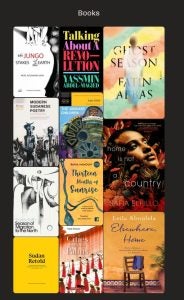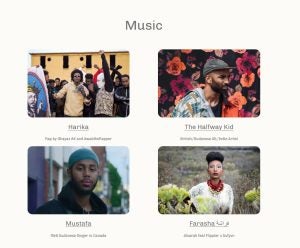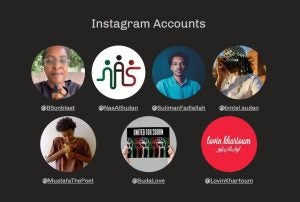
A new website created by MAAS students is helping educators teach about Sudan and bring Sudanese voices into the classroom
By Michael Overton
“Another war came crashing down on our bodies. The cut of a broken piece and the bite
of a broken promise are the same except with the first one death follows and takes everyone around you.”
– From “Sudan Balady” by Emi Mahmoud
The war that broke out between the Rapid Support Forces and the Sudanese Armed Forces in Khartoum in April 2023 is rooted in a larger history of colonial violence—one that led to ethnic cleansing in Darfur, the revolution that deposed al-Bashir in 2019, and the October 2021 military coup. The current violence has, as of 2024, led to the displacement of around 9 million people, including both refugees who fled the country and those displaced internally.

Considering the terrible humanitarian crisis, Sudanese activists have fought to spread informa- tion and provide financial support for those most affected, while activists around the globe have helped in elevating their efforts. Despite their good work, many people remain uninformed about what is happening in Sudan and many teachers are unaware of the resources that could help them bring these issues to their classrooms. Last year, as part
of the course “Studying the Arab World” (taught by Dr. Fida Adely and Dr. Rochelle Davis), Ingie Gohar, Shauna McLean, and I—all students in the MAAS program—teamed up in the hopes of making a project to address this gap. Our work culminated in the creation of an educational module and website titled “Teach Sudan,” which we designed to help teachers in English-language classrooms educate their students about Sudan’s history and culture, as well as the current war and its impact on displaced Sudanese people.
The Teach Sudan website includes separate portals for teachers and students, with the former providing a lesson plan designed to meet Common Core literature, writing, speaking, and listening standards for high school students. Included in the teacher’s portal are worksheets and additional activities they can incorporate according to their class- room needs. The student portal is highly interactive and features a follow-along series of activities that lead up to the final project: to research an example of Sudanese art, culture, or activism from the site’s resources section. “Researching contemporary media inspires students to engage with a wide variety of art and writing styles, rewarding creativity and active learning alongside skill development,” said McLean. Our team worked hard to compile a selection of movies, novels (and authors), poetry, music, Instagram pages, and websites to expose students to a diverse range of Sudanese art, culture, and activism. For example, Emi Mahmoud, whose story is one of resilience and humanity during times of conflict (and whose poetry is included at the start of this article), is just one of the Sudanese poets students encounter through the Teach Sudan lesson plan. “The foundation of active learning and participation is empathy, which necessitates the centering of Sudanese voices and experiences,” added McLean. “By allowing students to engage directly with Sudanese art through open-ended questions, they are given the opportunity to cultivate efficacy in key Common Core standards while maintaining empathy at the center.”

It was important to each of us to use our teaching module not only to expose students to Sudanese cultural production, but also to elevate the work
of Sudanese educators and activists. The resources section of the Teach Sudan website points visitors to projects like Keep Eyes on Sudan, Sudan Revolts, and Sudan Speaks—all rich examples of databases or educational pages that anyone can access in order to learn about what’s currently happening. As new projects, songs, pages, and more appear, we hope to add them to our resource page for students and teachers to utilize.
This April will mark two years since the beginning of the war, and one year since the creation of the Teach Sudan website. When Dr. Adely reached out to ask the three of us if we would be interested in participating this spring in a CCAS-led work- shop about Sudan for K-14 educators, we jumped
at the opportunity to gain feedback from teachers on the organization and appearance of the website. Moreover, the chance to demonstrate our website to teachers is, on its own, an honor. With the increasing attacks and threats to education, paired with the critical juncture the United States has reached in the past few months, the importance of teaching about other cultures and histories, and about displacement, is more important than it has ever been. Educators play a vital role in this regard, and as such, we want to make sure our website is something they can effectively use in order to teach empathy and critical thinking skills.

Our Youth Activism Lesson tells students, “For youth activists, art and social media each tie themselves to and strengthen the movement, while persistence keeps the ball rolling. Why not take a look at the resources provided—or better yet, at Eyes on Sudan—and see what catches your eye?” We sincerely hope that they do choose to examine these resources and expand their curiosity beyond our website, beyond their classroom, and perhaps as a result, expand their view of community. In that respect, I’d like to close with an excerpt from Safia Elhillo’s essay before/before, which she wrote after the 2023 war began:
My earliest teachers were those who walked and continue to walk beside me, who learn alongside me. In this way, my poetic lineage is situated not in the before, in the sense of being in the past. Instead, the poets I come from, are before me in the sense of being right in front of me, returning my gaze, answering my questions and asking their own. ◆
Michael Overton, originally from San Antonio, Texas, is a second-year student in the MAAS program. The resources section of the Teach Sudan website exposes students to a wide range of Sudanese literature, music, film, and activism.
This article was published in the Fall 2024-Spring 2025 issue of the CCAS Newsmagazine.